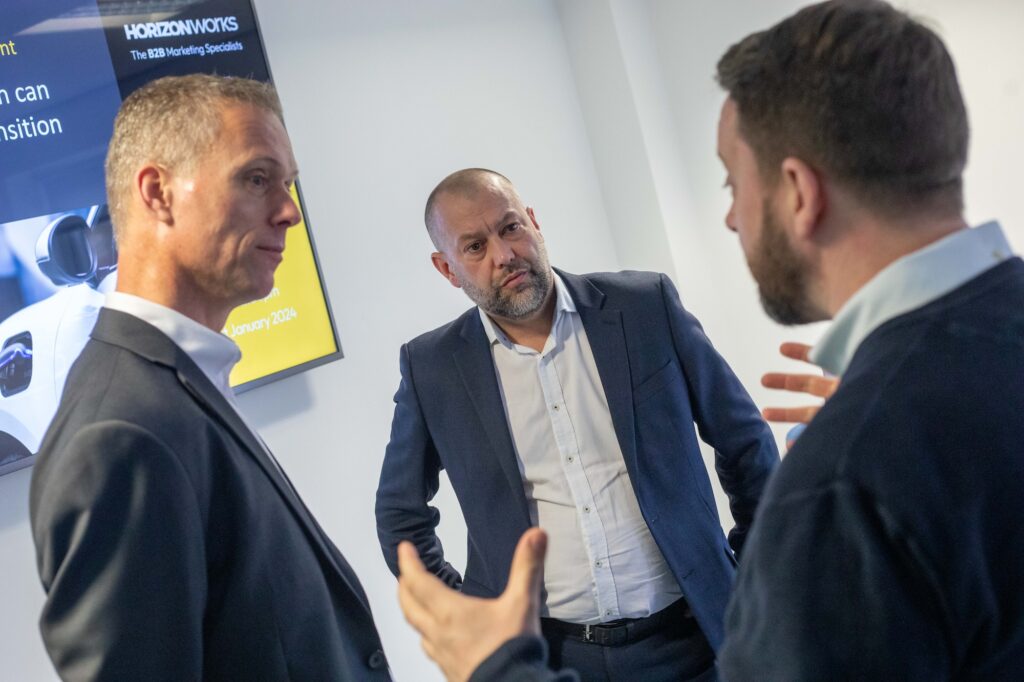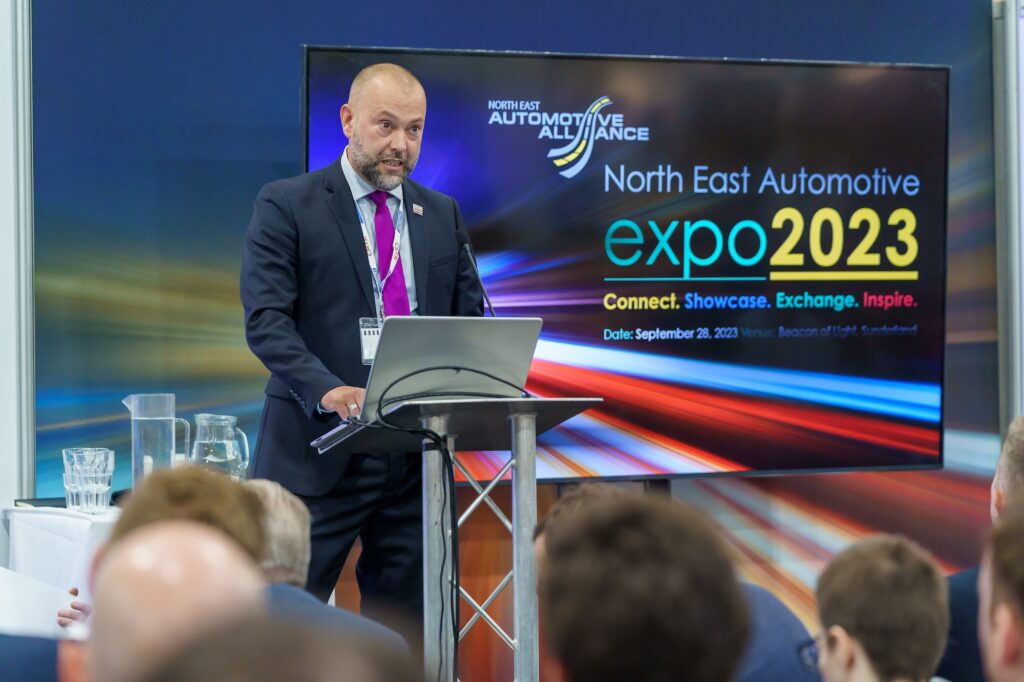
He’s the driving force behind the largest automotive cluster in the UK and a long-time champion for accelerating growth and investment across the North East. Paul Butler, CEO of the North East Automotive Alliance (NEAA), continues to play an integral role in positioning the region as the location of choice for automotive investment in Europe and he’s already caught a glimpse of the future.
“The next 12-18 months will be pivotal for the North East automotive industry,” he reveals. “There are a number of significant developments coming to fruition that will support the region moving forward. It’s a genuinely exciting time for everyone involved. Watch this space!”
Paul hinted at more positive steps forward for one of the region’s fastest growing manufacturing sectors during an enlightening presentation in South East Northumberland earlier this month.
Speaking at the latest Opportunity Series event, hosted by Cramlington-based international B2B marketing agency Horizon Works, he underpinned the NEAA’s mission to support a dynamic, forward-looking and competitive supply chain that complements research, development and innovation in new automotive technologies and manufacturing processes.
Acknowledging the wider challenges faced by firms negotiating their way through a potentially restrictive economic downturn, Paul nevertheless believes the North East’s unrivalled cluster of like-minded automotive businesses can point the way to future prosperity.

“With 275 member companies, eight industry working groups and five key focus areas, the NEAA represents a robust group ready to pitch the region as a true automotive powerhouse,” he adds.
“We have industry representation on 14 regional, national and international industry boards and we work alongside colleagues at the UK’s largest and most productive car plant at Nissan. We sit at the heart of a world class supply chain and we’re already the leading UK region for zero carbon vehicles.
“The UK government has outlined a clear path towards zero-emission vehicles representing 100 per cent of new cars and vans sold by 2035. The North East is already playing a key role in ensuring that target is hit.”
Paul’s interest in the wider power of connected clusters stretches back 25 years. Fast forward to 2024 and he’s widely recognised as one of the UK’s most authoritative voices when it comes to highlighting the value of interconnected businesses, suppliers and associated institutions.
“Back in the late 90s I worked for the Business Magazine Group and we had Business North East on our roster as one of eight business magazines covering the UK,” he explains. “I became involved in the management buyout and, as one of the directors, I started doing some contract publishing with clusters.
“From there I started working with The North East Of England Process Industry Cluster (NEPIC) and at that stage I put forward a proposal around me helping to grow their membership. I worked as part of the NEPIC membership team for 10 years and, at the same time, I studied for an MBA at Durham which included a dissertation on The Role Of SMEs In Clusters.
“Having led NEPIC through the bronze and gold label accreditation I was also the first UK based Local Benchmarking Expert and a member of the Cluster Excellence Expert Group with the European Secretariat for Cluster Analysis (ESCA).
“I managed an ERDF project to develop international trade through clusters which involved working with the automotive sector. One of my key roles at NEPIC was to develop international trade through clusters. It was all about developing a cluster-to-cluster relationship and accelerating a route to market. That’s what I brought to the NEAA.”
At the packed Horizon Works event Paul faced a series of tough questions from colleagues keen to understand how the UK’s electric vehicle infrastructure is keeping pace with production and whether the North East can, in fact, maintain its coveted position as the go-to destination for EV growth and investment.
News of fresh government support for AESC’s direct-to-Nissan gigabyte factories provides cause for renewed optimism but what about the elephant in the room? The much-touted gigabyte plant in Cambois, near Blyth, Northumberland, was once seen as vital to the region’s EV ambitions but what’s Paul’s take on a source of growing frustration?
“The first thing I’d say is that the Cambois plant isn’t critical to the growth that we’re forecasting,” he adds. “We need to think of it as an added bonus if — and, I believe, when — it comes to fruition.
“It’s widely recognised as the best site in the UK for the development of a new gigafactory and I’m convinced it will be developed in the future. There are so many cost savings associated with the site — it already has the grid connection and the capacity.
“It has its own substation, there’s the Nordic and green energy links and the Port of Blyth is a stone’s throw away. It’s the perfect base for a specialist electric battery manufacturer. The UK needs six to eight true gigafactories to meet demand and I’m convinced Cambois will be one of those in the future.”

Paul’s passion for clusters is, perhaps, only matched by his appetite for golf. The newly appointed vice-captain of South Moor Golf Club, in County Durham, uses a Sunday morning round to clear his head before another hectic week meeting with the North East’s automotive industry movers and shakers.
“I play for the team occasionally — when they’re a bit short,” adds the married father of two. “Golf is my getaway from the stress and strains of working life and I love being out on the course early before a day with the family. Between them my children, Mai and Lewis, love football, golf and horse riding, so the dad taxi metre’s always running! Family time’s hugely important to me.”
Paul can point to myriad examples of clusters sparking new business and underpinning sustained growth but he recalls one memorable deal done during his time with NEPIC as the perfect example of a collaborative approach reaping significant rewards.
“I guess one of the best examples I can use is when NEPIC was able to bring together Harlepool’s Exwold Technology and UPL Limited (formerly United Phosphorus) in India,” he adds.
“James Robson and the team at Exwold had been looking to do business with UPL for some time but just hadn’t been able to connect. Then the grandson of one of the UPL owners came to have a look around our NEPIC stand and we got talking.
“I introduced him to James and within a few minutes four UPL board members were doing business with Exwold. That’s the power of an effective cluster and efficient networking. It’s all about developing trade through relationships.”
And when it comes to developing those relationships, it seems Butler service is always best.
NEAA is working with the Government, through its UK Shared Prosperity Fund, and the City Of Sunderland to deliver Local Automotive Business Support (LABS) to firms across Sunderland. To find out more about a wide-raging package of support visit www.northeastautootivealliance.com

Durham Cathedral is the last resting place of the Venerable Bede whose Ecclesiastical History of the English People (c. AD 731) is one of the earliest history books.










